

Michael Herman: OpenSpaceTechnology. Open Space Technology (OST) It's been called meeting methodology, organization transformation, intentional self-organization and surfing the chaos.
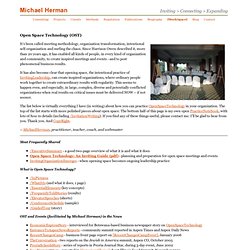
Since Harrison Owen described it, more than 20 years ago, it has enabled all kinds of people, in every kind of organization and community, to create inspired meetings and events - and to post phenomenal business results. It has also become clear that opening space, the intentional practice of InvitingLeadership, can create inspired organizations, where ordinary people work together to create extraordinary results with regularity. This seems to happen even, and especially, in large, complex, diverse and potentially conflicted organizations when real results on critical issues must be delivered NOW -- if not sooner. The list below is virtually everything I have (in writing) about how you can practice OpenSpaceTechnology in your organization. OpenSpaceWorld.ORG. Way of Council, Ancient way of the circle. Welcome to Open Space and. Writing Workshops, Wilderness Quests, Consulting, Mentoring, Circle Training.
Salon (gathering) A salon is a gathering of people under the roof of an inspiring host, held partly to amuse one another and partly to refine the taste and increase the knowledge of the participants through conversation.
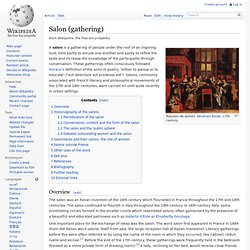
These gatherings often consciously followed Horace's definition of the aims of poetry, "either to please or to educate" ("aut delectare aut prodesse est"). Salons, commonly associated with French literary and philosophical movements of the 17th and 18th centuries, were carried on until quite recently in urban settings. The salon was an Italian invention of the 16th century which flourished in France throughout the 17th and 18th centuries. The salon continued to flourish in Italy throughout the 19th century. In 16th-century Italy, some scintillating circles formed in the smaller courts which resembled salons, often galvanized by the presence of a beautiful and educated patroness such as Isabella d'Este or Elisabetta Gonzaga. Home « Art of Hosting. Methods « Art of Hosting. World Café Method. Drawing on seven integrated design principles, the World Café methodology is a simple, effective, and flexible format for hosting large group dialogue.

World Café can be modified to meet a wide variety of needs. Types of democracy. Types of democracy refers to kinds of governments or social structures which allow people to participate equally, either directly or indirectly.[1] Democracies can be classified in different ways.
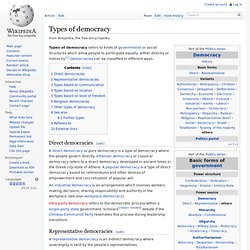
Direct democracies[edit] A direct democracy or pure democracy is a type of democracy where the people govern directly. Athenian democracy or classical democracy refers to a direct democracy developed in ancient times in the Greek city-state of Athens. Governance Models: what's right for your board of directors? Introduction Nonprofit boards tend to follow one of five different approaches to governance.
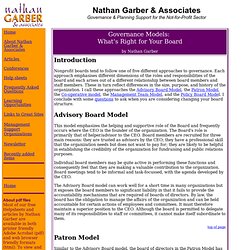
Each approach emphasises different dimensions of the roles and responsibilities of the board and each arises out of a different relationship between board members and staff members. These in turn reflect differences in the size, purpose, and history of the organization. I call these approaches the Advisory Board Model, the Patron Model, the Co-operative model, the Management Team Model, and the Policy Board Model. I conclude with some questions to ask when you are considering changing your board structure. Advisory Board Model. Sociocracy. Sociocracy is a system of governance, using consent-based decision making among equivalent individuals and an organizational structure based on cybernetic principles.[1] The most recent implementation of sociocracy by Gerard Endenburg,[2] also known as Circular Organizing, was developed as a new tool for governance of private enterprise, but has been adopted in many different kinds of organizations including public, private, non-profit and community organizations as well as professional associations.
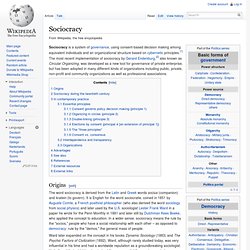
Origins[edit] The word sociocracy is derived from the Latin and Greek words socius (companion) and kratein (to govern). It is English for the word sociocratie, coined in 1851 by Auguste Comte, a French positivist philosopher (who also derived the word sociology from social physics) and later used by the U.S. sociologist Lester Frank Ward in a paper he wrote for the Penn Monthly in 1881 and later still by Dutchman Kees Boeke, who applied the concept to education. Essential principles[edit] Nomic. Nomic is a game created in 1982 by philosopher Peter Suber in which the rules of the game include mechanisms for the players to change those rules, usually beginning through a system of democratic voting.[1] Nomic is a game in which changing the rules is a move.
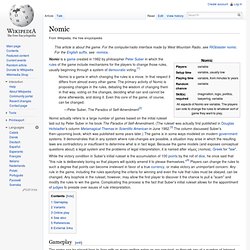
In that respect it differs from almost every other game. Nomic. Nomic is a game I invented in 1982.
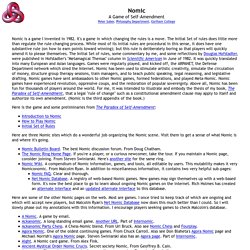
It's a game in which changing the rules is a move. The Initial Set of rules does little more than regulate the rule-changing process. While most of its initial rules are procedural in this sense, it does have one substantive rule (on how to earn points toward winning); but this rule is deliberately boring so that players will quickly amend it to please themselves. The Initial Set of rules, some commentary by me, and some reflections by Douglas Hofstadter, were published in Hofstadter's "Metamagical Themas" column in Scientific American in June of 1982.
It was quickly translated into many European and Asian languages. Here is the game and some preliminaries from The Paradox of Self-Amendment: Here are three Nomic sites which do a wonderful job organizing the Nomic scene. Nomic Bulletin Board.